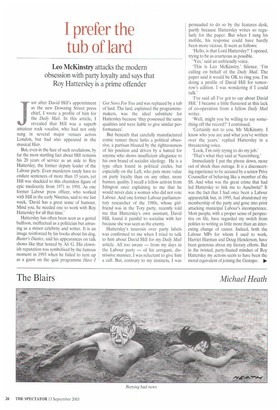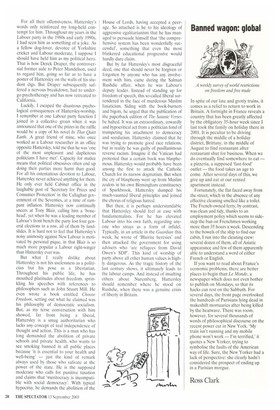I prefer the tub of lard
Leo McKinstty attacks the modern obsession with party loyalty and says that Roy Hattersley is a prime offender
irust after David Hill's appointment as the new Downing Street press chief, I wrote a profile of him for the Daily Mail. In this article, I revealed that Hill was a superb amateur rock vocalist, who had not only sung in several major venues across London, but had also appeared in the musical Hair.
But, even in the face of such revelations, by far the most startling fact about Hill remains his 20 years of service as an aide to Roy Hattersley, the former deputy leader of the Labour party. Even murderers rarely have to endure sentences of more than 15 years, yet Hill was shackled to this charmless figure of epic mediocrity from 1971 to 1991. As one former Labour press officer, who worked with Hill in the early Nineties, said to me last week, 'David has a great sense of humour. Mind you, he needed one to work with Roy Hattersley for all that time.'
Hattersley has often been seen as a genial buffoon, ineffectual as a politician but amusing as a minor celebrity and writer. It is an image reinforced by his books about his dog, Buster's Diaries, and his appearances on talk shows like that hosted by Ali G. His clownish reputation was symbolised by the famous moment in 1993 when he failed to turn up as a guest on the quiz programme Have I Got News For You and was replaced by a tub of lard. The lard, explained the programmemakers, was the ideal substitute for Hattersley because 'they possessed the same qualities and were liable to give similar performances'.
But beneath that carefully manufactured comic veneer there lurks a political obsessive, a partisan bloated by the righteousness of his position and driven by a hatred for anyone who shows insufficient allegiance to his own brand of socialist ideology. He is a type often found in political circles, but especially on the Left, who puts more value on party loyalty than on any other, more human, quality. I recall a fellow activist from Islington once explaining to me that he would never date a woman who did not vote Labour. And one former Labour parliamentary researcher of the 1980s, whose girlfriend was in the Tory party, recently told me that Hattersley's own assistant, David Hill, found it painful to socialise with her because she was seen as the enemy.
Hattersley's neurosis over party labels was confirmed to me when I tried to talk to him about David Hill for my Daily Mail article. All too aware — from my days in the Labour party — of his arrogant, dismissive manner, I was reluctant to give him a call. But, contrary to my instincts, I was persuaded to do so by the features desk, partly because Hattersley writes so regularly for the paper. But when I rang his mobile, his response could have hardly been more vicious. It went as follows:
'Hello, is that Lord Hattersley?' I opened, trying to be as courteous as possible.
'Yes,' said an unfriendly voice.
'This is Leo McKinstry.' Silence. 'I'm calling on behalf of the Daily Mail. The paper said it would be OK to ring you. I'm doing a profile of David Hill for tomorrow's edition. I was wondering if I could talk.'
'I've said all I've got to say about David Hill.' I became a little flustered at this lack of co-operation from a fellow Daily Mail writer.
'Well, might you be willing to say something off the record?' I continued.
'Certainly not to you, Mr McICinstry. I know who you are and what you've written over the years,' replied Hattersley in a threatening voice.
'Look, I'm only trying to do my job.'
'That's what they said at Nuremberg.'
Immediately I put the phone down, more out of shock than outrage. It is a disconcerting experience to be accused by a senior Privy Counsellor of behaving like a member of the SS. And what was the great crime that had led Hattersley to link me to Auschwitz? It was the fact that I had once been a Labour apparatchik but, in 1995, had abandoned my membership of the party and gone into print attacking municipal Labour's incompetence. Most people, with a proper sense of perspective on life, have regarded my switch from politics to writing as little more than an interesting change of career. Indeed, both the Labour MPs for whom I used to work, Harriet Harman and Doug Henderson, have been generous about my literary efforts. But in the twisted, party-fixated mindset of Roy Hattersley my actions seem to have been the moral equivalent of joining the Gestapo. 10. For all their offensiveness, Hattersley's words only reinforced my long-held contempt for him. Throughout my years in the Labour party in the 1980s and early 1990s, I had seen him as something of a joke. As a fellow dog-lover, devotee of Yorkshire cricket and Labour moderate, I suppose I should have held him as my political hero. That is how Derek Draper, the controversial former aide to Peter Mandelson, used to regard him, going so far as to have a poster of Hattersley on the walls of his student digs. But Draper subsequently suffered a nervous breakdown, had to undergo psychotherapy and has now retreated to California.
Luckily, I escaped the disastrous psychological consequences of Hattersley-worship. I remember at one Labour party function I joined in a collective groan when it was announced that one of the prizes in the raffle would be a copy of his novel In That Quiet Earth. A great friend of mine, who once worked as a Labour researcher in an office opposite Hattersley, told me that he was 'one of the most unpleasant and duplicitous politicians I have met'. Capacity for malice means that political obsessives often end up doing their parties more harm than good. For all his ostentatious devotion to Labour, Hattersley never achieved anything for them. He only ever held Cabinet office in the laughable post of 'Secretary for Prices and Consumer Protection' in the Callaghan government of the Seventies, at a time of rampant inflation. Hattersley now continually sneers at Tony Blair, calling him a 'bonehead', yet when he was a leading member of Labour's front bench the party lost four general elections in a row, all of them by landslides. It is hard not to feel that Hattersley's noisy animosity against New Labour is motivated by personal pique, in that Blair is so much more popular a Labour right-winger than Hattersley ever was.
But what I really dislike about Hattersley is not his uselessness as a politician but his pose as a libertarian. Throughout his public life, he has mouthed platitudes about freedom, sprinkling his speeches with references to philosophers such as John Stuart Mill. He even wrote a book entitled Choose Freedom, setting out what he claimed was his philosophy of democratic socialism. But, as my terse conversation with him showed, far from being a liberal, Hattersley is a smug authoritarian who lacks any concept of real independence of thought and action. This is a man who has long demanded the abolition of private schools and private health, who wants to see smoking banned in all public places because 'it is essential to your health and well-being' — just the kind of remark always used by those who salivate at the power of the state. He is the supposed moderate who calls for punitive taxation and claims that 'meritocracy is incompatible with social democracy'. With typical hypocrisy, he demands the abolition of the House of Lords, having accepted a peerage. So attached is he to his ideology of aggressive egalitarianism that he has managed to persuade himself that `the comprehensive system has been wonderfully successful', something that even the most blinkered educational progressive would hardly dare claim.
But by far Hattersley's most disgraceful deed, one that should never be forgiven or forgotten by anyone who has any involvement with him, came during the Salman Rushdie affair, when he was Labour's deputy leader. Instead of standing up for freedom of speech, this so-called liberal surrendered in the face of murderous Muslim fanaticism. Siding with the book-burners and bigots, he urged that the publication of the paperback edition of The Satanic Verses be halted. It was an extraordinary, cowardly and hypocritical act from a politician fond of trumpeting his attachment to democracy and secularism. Hattersley claimed that he was trying to promote good race relations, but in reality he was guilty of pusillanimous reverse racism. Imagine if the Vatican had protested that a certain book was blasphemous. Hattersley would probably have been among the first to attack the Catholic Church for its narrow dogmatism. But when the cry of blasphemy went up from Muslim zealots in his own Birmingham constituency of Sparkbrook, Hattersley dumped his much-vaunted liberal principles and joined the chorus of religious hatred.
But then, it is perhaps understandable that Hattersley should feel at ease with fundamentalists. For he has elevated Labour into his own faith, regarding anyone who strays as a form of infidel. Typically, in an article in the Guardian this week, he wrote of `Blairite heresies' and then attacked the government for using advisers who 'are refugees from David Owen's SDP'. This kind of worship of party above all other human values is highly dangerous. As the tragic history of the last century shows, it ultimately leads to the labour camps. And instead of insulting others about Nuremberg, Hattersley should remember where he stood on Rushdie, when there was a genuine crisis of liberty in Britain.



























































































 Previous page
Previous page